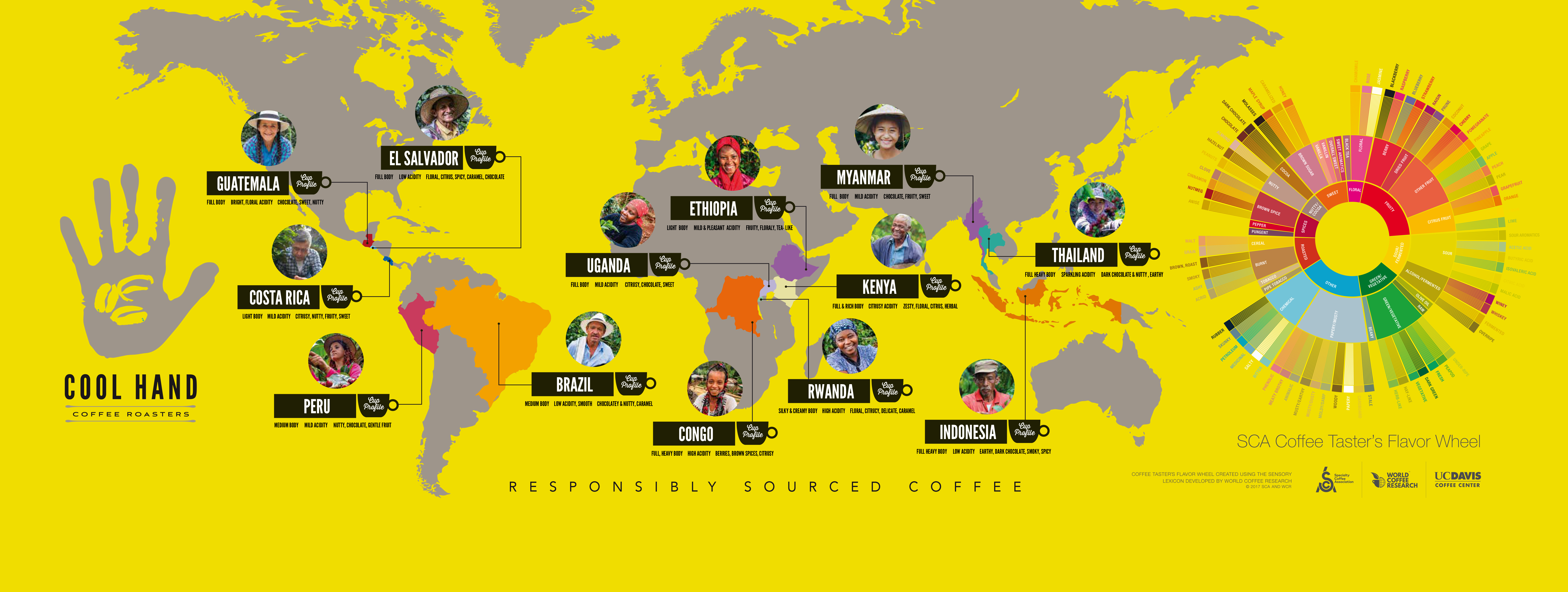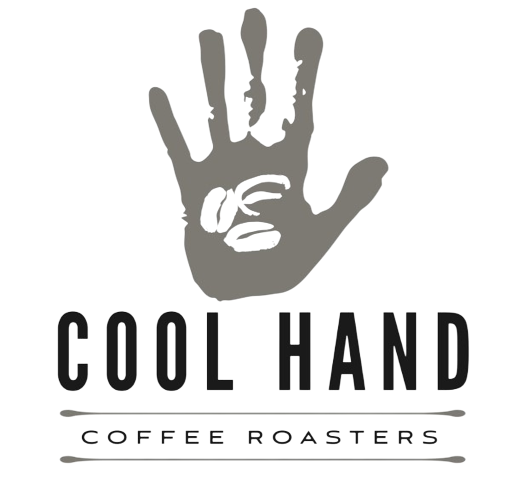Coffee Farmers
MEET Our Coffee Growers

EVERY COFFEE FARMER, EVERY COFFEE TREE HAS THEIR UNIQUE STORY TO SHARE WITH YOU
BRAZIL
Producer: Walter & Ednilson Dutra
Fazenda Dutra is a family-run farm in São João do Manhuaçu, 300 kilometres inland from the east coast of Brazil, owned and operated by the two brothers Ednilson and Walter. They were born on the farm and have been coffee producers all their
lives. Their father started the farm in the 1950s with one hectare, buying a second and third hectare from the farm’s profits until he had grown his land to more than 1100 hectares.
COLOMBIA
Producer: COOCAFE
The Sierra Nevada is an isolated mountain range in northern Colombia, separated from the Andes and running through the center of the country. At an altitude of 3500masl and only 42km from the Caribbean coast, it is the highest coastline in the tropics and one of the highest coastlines in the world. Coffee is mainly grown by indigenous groups in this region. This coffee comes from the CAFICOSTA cooperative, a cooperative with 2600 members including 600 women and 500 organic producers. CAFICOSTA supports producers by supplying fertilizers and consumables, tools, and machines.
CONGO
Producer: CPNCK
Island of Idjwi
The island of Idjwi is not a place you used to hear about often, but with the digital awakening of Africa and an influx of interest from the development community, we are starting to understand its equally tragic as wonderful history. A refuge for rebels, a smug- gler's hotspot, a volcanic danger zone or the Kivu region's newest specialty coffee discov- ery - all describe this remote lake island accurately.
COSTA RICA
Producer: Daniela Gutiérrez
Tarrazú, Micromill La Montaña Tarrazú
La Montaña Tarrazú is a family-owned mill. The youngest of three sisters, Daniela, is running the mill. She decided to finish her studies before actively joining the business as manag- er of La Montaña Tarrazú, four years ago. Now she’s in her mid-20s and keen on maintaining the high-quality standard of the coffee as well as optimising processes. They carefully pro- cess fully washed, honeys and naturals. Fully washed beans are mainly dried outside on the patio, whereas honeys and naturals dry on raised beds.
EL SALVADOR
Producer: CafeNor
Metapan
Cafenor is dedicated to the production and commercialization of special coffee, they are the support for the commercialization of 65 small (1-3 hr.) neighboring producers. All coffee is dried in shaded beds and processed in our facilities powered by clean energy (photovoltaic).Cafenor produce washed coffee from 84 - 88 points, all our coffee is cupped in small batches to form set's / blend's of different qualities and varieties Pacas - Bourbon and Pacamara.Cafenor is using solar sytem in theirs carbon neutral mills.
ETHIOPIA
Producer: Warmena Washing station
Guji
This Natural Guji Grade 1 is from Wamena Washing Station, which is surrounded by the eponymous Wamena river. The river is known by the community for its holy water that brings prosperity and peace. Wamena WS was founded by Ahadu Woubshet who owns a further washing station in Ethiopia and decided to build up this unique site at the highest mountain peak of Hambela, in the Guji region. The washing station has a distinct Guji taste. The area is known for its rich spice and citrus notes, crisp acidity, and rich body.
GUATEMALA
Producer: Covadonga
Antigua Guatemala, Sacatepéquez Department
This is the Guatemala Covadonga brought to you by Camber Coffee. Covadonga is a small estate located in the region of Antigua (nestled within three volcanoes), and has been a family owned enterprise for over one hundred years.
HONDURAS
Producer: Cafeshsa
Comayagua
CAFEHSA is located in Comayagua, between the Montecillos mountain range and Comayagua mountain, a privileged area with special edaphoclimatic conditions for coffee production. The partners from CAFEHSA regularly participate in activities with the Local Agricultural Research Committee (CIAL), an organization of coffee producers founded in 2012, in the department of La Paz, with the purpose of training coffee producers on organic fertilizers and ferments.
INDONESIA
Producer: Ontosoroh Coffee
Enrekang
Indonesia is a very underrated coffee origin. if you find the right partners to foster good agricultural practices at farm level and to help farmers unleash the full flavour potential in their crop, Indonesian coffees have proven themselves to be absolutely outstanding in depth and richness.
KENYA
Producer: Steans Beans
North of the Rift Valley
The Sakami farm is creating "agroforestry" by intercropping macadamia trees between coffee (hand picked by women), protecting all indigenous trees in and around the farm, protecting the wetland by not interfering on it, leaving natural bush sections in and around the coffee trees, having beehives around the farm, and avoiding the use of pesticides or herbicides. All "waste" such as coffee pulp and macadamia husks are fed to earth worms and worm castings are returned back to field as manure or used to make foliar feed. Water from pulping and washing the coffee is treated in a settling pond with lime and then used to irrigate the pasture below the ponds. Next to all this, Sakami uses mineral fertilizers to replace the nutrients taken away when harvesting cherries.
MEXICO
Producer: Procafem
PROCAFEM was founded in 2002 and has 456 members from the Mocho ethnic group. Their mission is to produce high-quality coffee while preserving the environment in and around Motozintla. PROCAFEM groups small farmers around the Sierra Madre mountain range, home to a wide variety of plants and animals. The cooperative focuses on sustainable coffee production by implementing environmentally responsible practices and providing technical and economic support and social incentives to its partners and the community.
MYANMAR
Producer: Indigo Mountain Company
Shan State in Myanmar
Myanmar has only recently been creating specialty coffees but is doing so with impressive speed and results. Hopong was able to organise coffee farmers from two villages in just one year and collectively process their very first batch of sun dried natural coffee - and even find an export outlet in the same season thanks to Sara Morrocchi.Fed up with secretly producing opium for drug lords while being prosecut- ed by authorities on the one hand, and selling poorly processed coffee to brokers and middlemen on the other, the Hopong farmers started looking for a new way of life.
Peru
Association Café Del Futuro
PROJECT COFFEE
The cooperative was founded in 2007 and stands for high-quality coffees with selected varieties and a strong focus on certified coffee. The farmers mainly cultivate varieties such as Caturra, Bourbon and Mundo Novo, which flourish well between the provinc- es of Jaén and San Ignacio. We have a close partnership with Asociación Café del Futuro, which we visited in 2019, and have been sourcing coffee from them ever since. Each coffee-producing family receives 10 raised beds of 7.5 square meters as well as seeds from regional vegetables, tools and know-how.
RWANDA
Producer: Kigeme
Southern Province/Nyamagabe District
Kigeme Washing Station is located in Kigeme/Nyamagabe Southern Province. This coffee grows at an altitude of 2070m. Kigeme CWS is among our washing station that has a big organic coffee plantation with 6.4 hectares of coffee plantations that is in process of certification. Kigeme CWS has a capacity of producing 100 MT of parchment coffee per season. It is located close to Nyungwe forest, intense rainfall throughout the year, and all cherries are harvested from elevated hills.
UGANDA
Producer: Zambo Coffee Parners
Ovuru Village, Paidha, Zombo District,
Uganda has never been a favourable place to be a coffee farmer. However, specialty coffee is slowly on the rise. With incredible growing conditions and the help of some of the industry’s most renowned devel- opmental entrepreneurs, we are helping to breathe new life into the region of Zombo in the northwest of the country.Zombo works with a concept called coffee microstations. These are miniature central coffee washing station that is within the means of a small group of farmers to construct and manage, with a minimum of external support.
